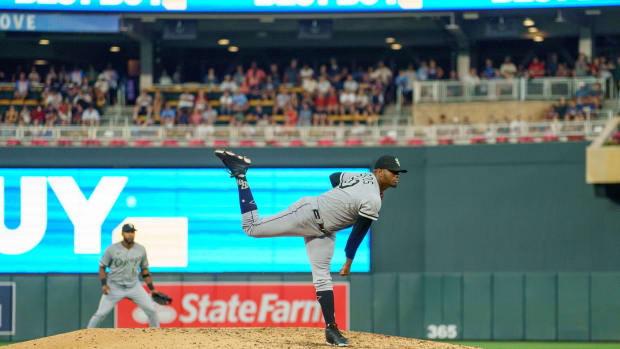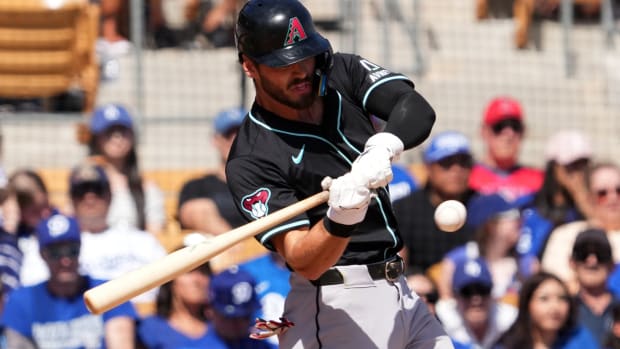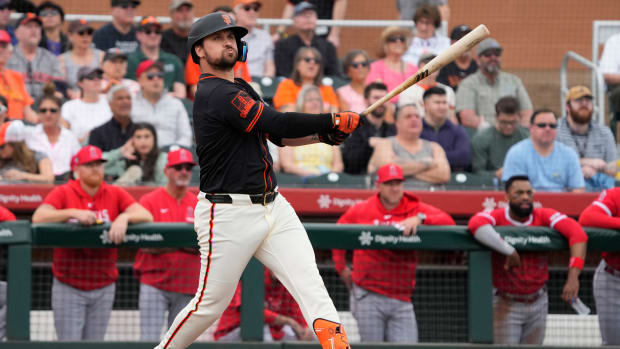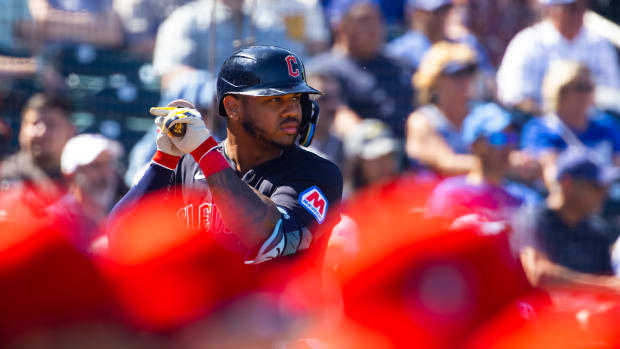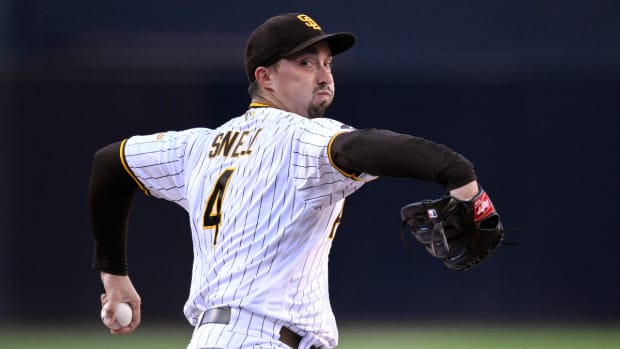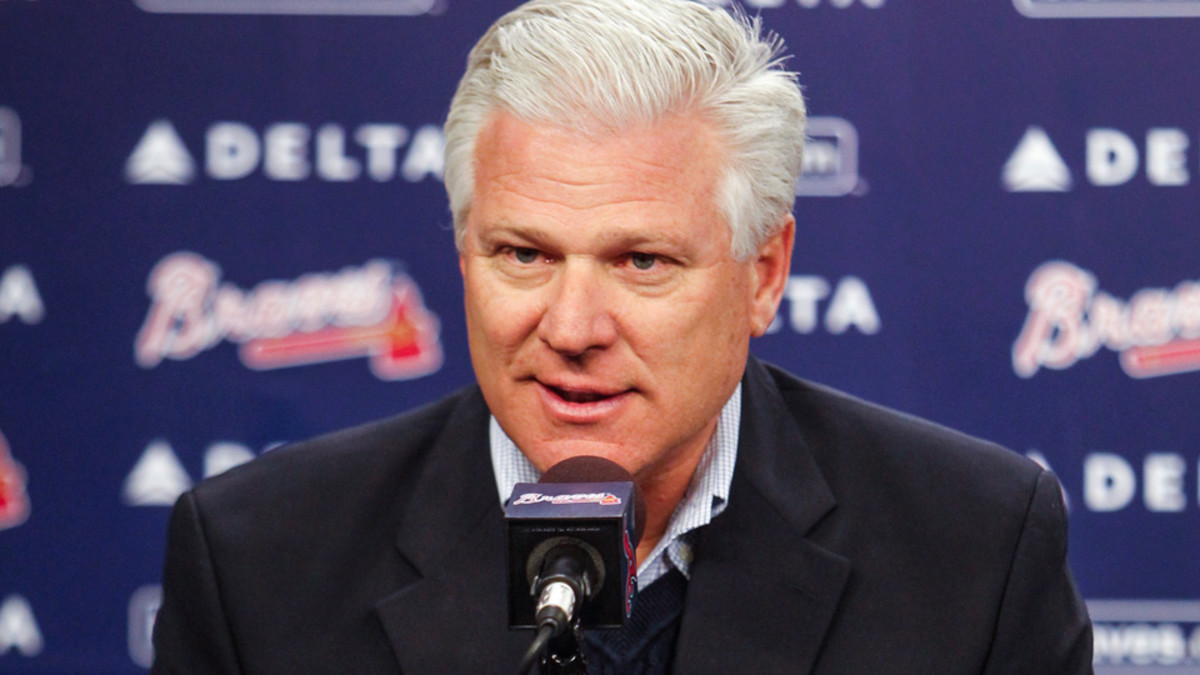
With playoff hopes done, Braves fire general manager Frank Wren
On the heels of yet another late-season disappointment, the Braves have decided to shake things up. On Monday morning, they announced that general manager Frank Wren has been fired after seven seasons on the job. The job of manager Fredi Gonzalez is safe for the moment, though a new GM could opt to make a change.
On the heels of three playoff appearances in the previous four seasons, the Braves appeared within range of another postseason berth for the first five months of this season. They jumped out to a 17-7 start despite losing both Kris Medlen and Brandon Beachy to their second Tommy John surgeries in spring training, and went into the All-Star break tied with the Nationals atop the NL East at 52-43. The Baseball Prospectus Playoff Odds Report estimated Atlanta's chances of reaching the postseason at 64 percent (35 percent for the division, 29 percent for the Wild Card).
Braves, Blue Jays both blow chances at division, playoff dreams
Since then, the team has gone just 24-36. By plodding through the second half of July and all of August, they were left in the dust in the division race, six games behind the Nationals and with odds of just four percent. Despite that, as September dawned, the Braves were still 72-65, 1 1/2 games out of a Wild Card spot, with a 46 percent chance at securing one. But they’ve gone just 4-14 this month, including this weekend’s three-game sweep by the Mets at Turner Field. Amid that 18-game slide, their offense has produced just 2.22 runs per game — reminding all concerned both of the team's recent legacy of late-season fades and of Wren's mistakes in assembling the current roster.
Indeed, for all the Braves' success at reaching the postseason, they haven't won a playoff series since 2001 — the days of Greg Maddux, Tom Glavine, John Smoltz, Chipper Jones, Bobby Cox and a run of 14 trips to the postseason in 15 years (excepting the 1994 strike). Wren, who joined the organization as vice president and assistant general manager in 2000, took over from the architect of those teams, John Schuerholz, after the 2007 season. The Braves stumbled to 72-90 the following year, their worst record since 1990, but they had finished above .500 in the five seasons since. They won 91 games and the NL Wild Card in 2010, Cox's last season, but were bounced by the Giants in a four-game division series.
Brewers' September woes continue with crushing loss to Pirates
Under Gonzalez, their September and October failures have grown only more glaring. The Braves entered September 2011 with the league's second-best record at 80-55, but went 9-18 the rest of the way; with five games to go, they owned a three-game lead over the Cardinals in the Wild Card race, but lost all five and missed the playoffs. In 2012, they went 20-10 after Aug. 31 en route to 94 wins, good enough to tie for the league's third-best record, though it only earned them home field advantage in the new-fangled Wild Card game, which they lost to the 88-win Cardinals.
In 2013, Atlanta opened September with the NL's best record at 83-52 but went just 13-14 the rest of the way. Surpassed by the Cardinals for the NL's top mark, the Braves drew the Dodgers instead of the Wild Card winner in the Division Series and lost in four games, in part because of Gonzalez's commitment to bullpen orthodoxy. Setup man David Carpenter took the loss in the deciding game, allowing a game-winning home run to Juan Uribe in the eighth inning, while closer Craig Kimbrel could only watch.
As noted previously, Gonzalez's bullpen mismanagement — primarily by keeping Kimbrel from pitching in the ninth inning of tie games on the road — exacerbated the Braves' second-half woes. The 50-year-old pilot should have to answer for those and his other tactical shortcomings, as well as the consistency of those late-season collapses, which at the very least suggest his team's lack of focus or preparation.
After flurry of failed moves, Towers fired as Diamondbacks' GM
Even so, it's Wren who built the roster, made expensive mistakes and failed to fix holes. The team's undoing has been its offense, which ranks second-to-last in the league in scoring (3.57 runs per game). Free agent signing B.J. Upton (.207/.282/.327, -1.0 WAR) has been an unmitigated disaster through the first two seasons of his five-year, $75.25 million deal; he's owed more than $46 million for the next three seasons. Rookie second baseman Tommy La Stella (.252/.330/.319, -0.3 WAR) hasn't done enough to offset the damage done by the since-releasedDan Uggla (.162/.241/.231 and -0.9 WAR in 145 first-half PA), who was still owed around $20 million through next year when he was cut. Chris Johnson, one of four players signed to long-term extensions this spring, has hit .264/.295/.357 with lousy defense en route to -1.5 WAR. Deadline acquisition Emilio Bonifacio (.240/.291/.292 in 103 PA), Wren's lone stab at reinforcing the offense via trade, has failed to deliver in a supporting role behind Upton.
Dumping Uggla with so much salary remaining recalled two of the most glaring mistakes from earlier in Wren’s tenure: the January 2009 additions of righties Derek Lowe and Kenshin Kawakami. Signed to a four-year, $60 million deal, Lowe produced just 1.8 WAR through the first three seasons before being traded to the Indians after the 2011 season; the Braves ate $10 million of his remaining $15 million. Kawakami, signed to a three-year, $23 million deal after coming over from Japan, produced just 1.2 WAR during his tenure; he was solid as a 34-year-old rookie but was banished to the minors in late 2010, and spent his final season under contract getting bombed in the minors.
In final days, Bud Selig keeps turning blind eye to Mets' mess
Which isn't to say that Wren hasn't had his successes. Homegrown players such as Kimbrel, Mike Minor, Andrelton Simmons, Alex Wood and Evan Gattis were drafted during his time as GM, and the bulk of the careers of 2007 additions-turned-mainstays Freddie Freeman, Jason Heyward and Julio Teheran — the first two added via draft, the latter via international signing — have unfolded on his watch. The January 2013 trade for Justin Upton, which additionally brought Johnson (who had a strong 2013) at the cost of Martin Prado, Randall Delgado and three minor leaguers, has definitely worked in Atlanta's favor; Upton has hit .271/.344/.488 with a team-high 27 homers this year.
Reliever Jordan Walden, acquired in a November 2012 trade that sent Tommy Hanson to the Angels, has given the team two decent seasons in a setup role, and while injuries have limited him to just 94 2/3 innings over the past two seasons, the once-promising Hanson's career has since fallen into minor league oblivion. Carpenter, plucked off waivers from the Red Sox in November 2012, was strong in a setup capacity last year, but has struggled this year, mainly due to a 79-point rise in BABIP (from .263 to .342).
In the wake of the losses of Medlen and Beachy this spring, Wren quickly patched this year's rotation by signing free agents Ervin Santana and Aaron Harang, the latter of whom had just been released by the Indians; the pair both have ERAs slightly worse than league average due to .320ish batting averages on balls in play, but their peripherals have been solid, and they've combined to deliver quality starts 69 percent of the time, well above the 56-percent league average.
Team Entropy: With one week left, AL still has chance at chaotic finish
In the face of a failing offense, however, that wasn't enough. In August, it was reported that Braves chairman/CEO Terry McGuirk — the only man above team president Schuerholz in the pecking order, excluding the faceless ownership group — told USA Today that Wren and possibly Gonzalez would be fired if the team missed the playoffs. On Sunday, they were mathematically eliminated, and on Monday morning, it was Wren's head on a plate, albeit with rumors that he wanted to fire Gonzalez but met resistance from Cox.
Former Indians and Rangers GM John Hart, a close friend of Schuerholz who has served in an advisory capacity for the past year, will serve as interim GM and as part of a three-man search committee for a successor alongside Schuerholz and Cox. Assistant GM John Coppolella, who has been with the team since 2006 after five-seasons with the Yankees, is a strong candidate for the permanent job. Long considered an executive on the rise, he headed the class in a June roundup of future GMs done by Baseball Prospectus' Jason Parks:
A rising star in the industry for some time, the former student manager for the Notre Dame football team has injected the characteristics of winning into his DNA through nearly 15 years experience with the two most successful franchises in the modern era (Yankees/Braves). Coppolella is fluent in both the esoteric language of scouting (he still directs pro scouting for the Braves) and the importance of advanced statistical analysis, a marriage of information management that would allow him to thrive at the helm of a team as a younger upside play. It's an eventuality that both the writers at Baseball Prospectus (he received the most votes) and his peers in the industry think happens sooner rather than later.
At Monday's press conference to announce Wren's dismissal, Schuerholz told reporters, "It is not a completely closed or open door" as far as Hart removing the interim from his title to take the job himself, but the 66-year-old Hart said, "No. I'm not seeking the job. I'm not knocking on the door, looking to jump back in."
Awards Watch: Stanton injury leaves NL MVP race wide open
Competitive nearly every year since 1991, the Braves set a very high standard, but whether it's Hart, Coppolella or somebody from outside the organization, their next GM will have some challenges in store due to the team's payroll limitations and substandard TV contract. He'll inherit a roster that has nearly $80 million committed to just eight players, likely with a mandate to trim payroll below this year's club-record $112 million.
On the other hand, Freeman, Johnson, Kimbrel, Simmons and Teheran are all signed through at least 2017 on team-friendly extensions of the type pioneered by Hart when he was GM of the Indians' mid-1990s powerhouses. Santana and Harang are the most notable pending free agents this winter, with Heyward and Justin Upton signed through next year. Gonzalez is as well, via an extension of indeterminate length announced in February, though it's worth noting that Wren received an extension at that time as well.
Given the success of predecessors Cox (the Braves' GM from October 1985 to October 1990 before returning to the dugout) and Schuerholz (1990-2007), Wren is the first Braves GM to get the axe since John Mullen in 1985. But in the wake of a disappointing season, change is coming. Only the scale of it remains to be seen.






























